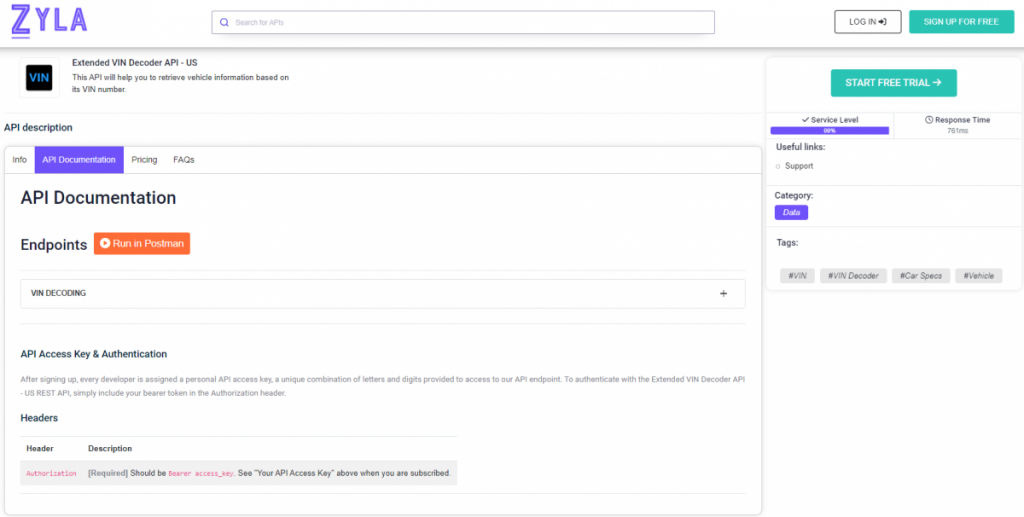In a world where technology ceaselessly propels innovation, the realm of automobiles stands at the forefront of transformation. The fusion of vehicles and digital interfaces has ushered in an era of unprecedented possibilities. Among the many groundbreaking advancements, Vehicle Info APIs have emerged as the unsung heroes. This shapes the automotive landscape with data-driven precision. This article aims to be your compass through this revolutionary terrain, providing an in-depth understanding of Vehicle Info API and their transformative potential.

The Road To Vehicle Info API
The first step on this enlightening journey is understanding the essence of Vehicle Info APIs. APIs, or Application Programming Interfaces, are instrumental bridges connecting different software systems. When it comes to vehicles, these APIs are specifically designed to enable communication between applications and a car’s electronic control units (ECUs). This unlocks access to a treasure trove of information. These APIs represent a symphony of data points, encompassing engine diagnostics, fuel efficiency metrics, location tracking, and an array of sensor-derived insights. This technology is by no means a novelty but has recently gained significant prominence. This is due to the burgeoning demand for smarter, data-driven mobility solutions.
The Driving Force Of Vehicle Info APIs
First and foremost, Vehicle Info APIs offer a plethora of benefits to various stakeholders within the automotive ecosystem. Automakers are empowered to design vehicles with enhanced safety features and efficient energy consumption through real-time data analysis. For automotive service providers, these APIs expedite diagnostics and predictive maintenance, reducing downtime and costs. Furthermore, fleet operators can harness the power of Vehicle Info APIs to optimize routes, monitor driver behavior, and boost overall operational efficiency. However, the most exciting aspect of these APIs is the profound impact they have on the end-user. Vehicle owners can enjoy comprehensive insights into their vehicles’ performance. Thus, enabling proactive maintenance and ensuring a safer, more economical driving experience.
Navigating The Future With Vehicle Info APIs
As we stand on the cusp of a new automotive era, it is clear that Vehicle Info API are the technological underpinning of this transformation. The roadmap ahead includes even greater integration with artificial intelligence and the Internet of Things (IoT), expanding the capabilities of these APIs to deliver a truly immersive driving experience. The adoption of standardized API protocols will facilitate seamless communication between different car brands, service providers, and third-party applications, making interconnected mobility a reality. In conclusion, Vehicle Info APIs are not merely a technological advancement; they are the engine driving the future of automobiles, shaping a world where vehicles are smarter, safer, and more efficient than ever before.
Incorporating these APIs into your vehicle can be likened to installing a state-of-the-art navigation system, ensuring you never lose your way in the vast landscape of automotive technology.
Check Extended VIN Decoder API – US
If you’re looking for a comprehensive and reliable VIN decoder API for the US market, the Extended VIN Decoder API – US from Zyla Labs is a great option to consider. This API provides access to a vast database of vehicle information, including make, model, year, transmission type, mileage, engine details, and more. It also includes additional information that does not typically appear in other VIN decoder APIs, such as vehicle options, safety ratings, and warranty information.

The Extended VIN Decoder API – US is easy to use and provides fast and accurate results. Simply provide the VIN of the vehicle you want to decode and the API will return a detailed report with all of the relevant information. The API is also scalable, so you can easily integrate it into your own applications and workflows.
Here are just a few of the things you can do with the Extended VIN Decoder API – US:
- Verify the details of a vehicle that you have an interest in purchasing or selling
- Identify vehicles that are subject to recalls or safety advisories
- Get accurate estimates of a vehicle’s value
- Generate vehicle reports for insurance or financing purposes
- Develop custom applications that leverage vehicle data
If you need a VIN decoder API that can provide you with the most comprehensive and accurate vehicle information available, the Extended VIN Decoder API – US is the perfect solution.
All You Need To Do To Make Use Of It Is:
- First, go to Extended VIN Decoder API – US and click the “START FREE TRIAL” button.
- You will be able to access the API once you have registered with the Zyla API Hub.
- Use the API endpoint “VIN DECODING”.
- Click the “test endpoint” button to make an API call and examine the results on your screen.
For example, if you add a VIN number like 479, it will provide you with a response similar to this:
{
"brandName": "NISSAN",
"modelName": "Maxima",
"regionName": null,
"condition": null,
"msg": null,
"cacheTimeLimit": 120,
"data": {
"AirBagLocFront": "1st Row (Driver and Passenger)",
"BodyClass": "Sedan/Saloon",
"DisplacementCC": "3000",
"DisplacementCI": "183.0712322841",
"DisplacementL": "3",
"Doors": "4",
"EngineConfiguration": "V-Shaped",
"EngineCylinders": "6",
"EngineManufacturer": "Nissan",
"EngineModel": "VQ30",
"FuelTypePrimary": "Gasoline",
"Make": "NISSAN",
"MakeID": "478",
"Manufacturer": "NISSAN MOTOR COMPANY, LTD",
"ManufacturerId": "996",
"Model": "Maxima",
"ModelID": "2302",
"ModelYear": "1999",
"OtherRestraintSystemInfo": "3-Point manual belts",
"PlantCity": "YOKOSUKA CITY",
"PlantCompanyName": "Oppama Plant",
"PlantCountry": "JAPAN",
"PlantState": "KANAGAWA",
"SeatBeltsAll": "Manual",
"VIN": "JN1CA21DXXT805880",
"VehicleDescriptor": "JN1CA21D*XT",
"VehicleType": "PASSENGER CAR",
"RecallInfo": []
}
}
Finding APIs is straightforward thanks to Zyla Labs, a marketplace with top-notch service. Among the more than 1200 APIs that are available, you can narrow your search by using a category, word, or programming language. Each API is fully described in the marketplace, including the price, accompanying files, and terms of service.
Want to learn more? Read Fueling Progress: A Vehicle Information API Unleashed

